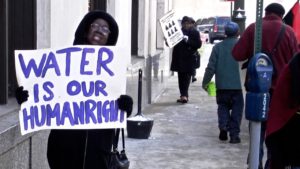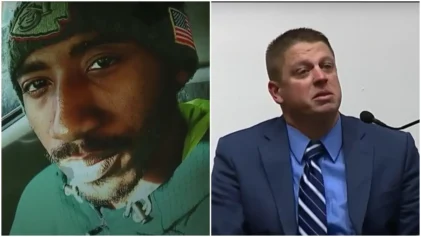
occupy.com
Detroit residents can’t seem to get a break.
Around 20,000 customers may have their water shut off on Tuesday, when the Detroit Water and Sewerage Department said it would begin the process for customers in default on their water bill. The news comes as local teacher union officials announced the end of the city’s two-day teacher sickouts.
DWSD Spokeswoman Linda Clark said the department had delayed the shutoffs, originally scheduled for Monday, by one day as a courtesy to customers.
“We want to give our customers every opportunity to schedule arrangements,” Clark said. “We wanted to give them another day.”
Clark said the department was struggling to keep up with the payments flooding in since Monday.
“We’re receiving payments every minute. We’re also getting more than 250 phone calls coming in an hour,” she said. “There aren’t any hard numbers at this point. It’s difficult to say because of the number of payments we’re processing.”
Michigan Radio reports the average monthly water bill in Detroit is $75, while the average amount owed past due is $633.
Those with unpaid bills can catch up through department payment plans, which allow customers to make a 10 percent down payment on the debt with the remaining balance due in installments over the next 24 months.
Why are the debts still so high?
Many customers find it difficult to stay on top of the plan in addition to a regular monthly bill. Customers who miss a payment must pay 30 percent of their bill to get back on the plan. The amount increases to 50 percent should they miss a second payment.
Clark stressed that department officials were targeting non-paying customers equally, with no respect to the residents’ location in the city, according to The Detroit News.
“We’re looking for those customers who we’ve repeatedly tried to reach and make contact,” Clark said.
But the city has a history of racially motivated shutoffs, according to a claim by the NAACP Legal Defense Fund in 2014.
“That (the shutoffs are) being done in a discriminatory fashion; and they should at least take a look at whether there’s a better way to do this that doesn’t affect the most vulnerable citizens — the majority of whom are African-American here in Detroit,” Veronica Joice, a rep for the NAACP Legal Defense Fund told the media then, as Atlanta Black Star reported.
Attorney Alice Jennings filed the lawsuit on behalf of Detroit residents. She said that the DWSD should look to big corporations, who owe the department hundreds of thousands, for payment.
“These companies are basically Caucasian companies,” Jennings said. “The folks who are being cut off are almost 100 percent African-American.”
The city was facing an embarrassing bankruptcy case and reports estimated that the DWSD accounted for $5 billion of Detroit’s $18 billion debt.
Detroit attracted international criticism for its shutoff policy that year, with groups calling on the United Nations to intervene. Activists called it a violation of human right to water. The Human Right to Water and Sanitation was officially recognized by the United Nations General Assembly in 2010.
Community leaders accused DWSD of charging excessively high rates in order to rid itself of low-income customers and woo private companies for a possible takeover.


